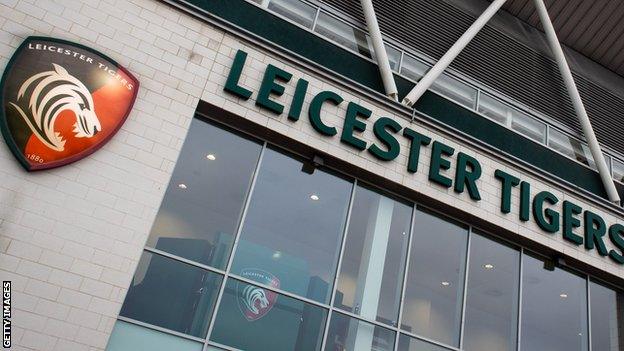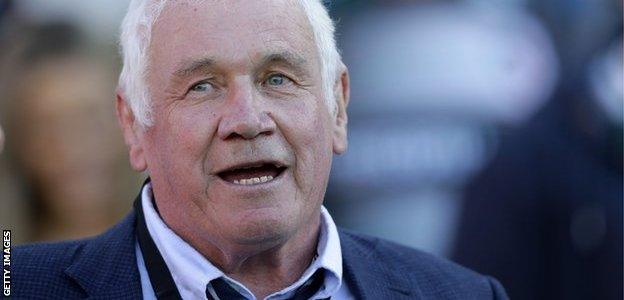Leicester Tigers up for sale in effort to remain Premiership force
- Published

Leicester Tigers have failed to reach the Premiership play-offs in each of the past two seasons
Fresh investment in Leicester Tigers will help ensure the club remains a force in the Premiership, according to club chief executive Simon Cohen.
Tigers, who have won 10 Premiership titles and two European Cups, have been put up for sale for about £60m.
Their last Premiership triumph, however, came in 2013 and they battled to avoid relegation last season.
"It's a very big club and extra investment means it will continue to be a very big club," Cohen said.
"This club is all about winning, and significant extra investment - if we can secure it - gives us a much better opportunity of winning.
"We are looking to be well placed as the game changes quickly. That might only require a minority stake, majority stake or all of it."
However, Cohen also told BBC East Midlands Today there was "no need" to sell.
"The main criterion is somebody - or some entity - who wants to take the club forward has to be somebody who understands what Leicester represents within the community and wants to enhance that," he said.
Zeus Capital have been appointed to help broker a deal after the East Midlands club was approached by several bidders soon after CVC bought a 27% stake in Premiership Rugby, worth more than £200m, in December.
'No surprise people want to buy'

Peter Tom, who made 130 first-team appearances for Leicester Tigers between 1963 and 1968, has served as chairman for more than two decades
Leicester chairman Peter Tom said Premiership Rugby's "transformation" following that investment prompted the Tigers' board to put the club up for sale.
"It suddenly put a value of £800m-£850m on the Premiership and that completely changed the landscape," Tom told BBC Sport.
"It's been transformed in terms of people's perception of where rugby is and where rugby is going. As a result we have had quite a number of approaches from people and institutions looking to possibly invest in or buy the club.
"We are in a strong financial position, we have no debt and this is one of the best supported clubs in the world, so it is not surprising that we had these approaches.
"We have decided to deal with them in a proper and formal way to ensure that we make a decision that is in the best interest of the Tigers in the long term.
"It's exciting and a big day. Zeus will explore and see what these approaches may or may not mean as far as Tigers are concerned."
With several bidders involved, Tom said it could take six months for a sale or injection of investment to happen in a club valued at more than £60m.
Tom is one of Leicester's biggest stakeholders with 9% of shares, while lifelong Tigers fan and businessman Tom Scott holds a majority share of 46%.
There are also 10,000 members who own shares and cumulatively have a 39% stake in the club.
'Revolution needed'

Leicester Tigers have not won the league title since 2013
Bleddyn Jones, the former Tigers fly-half who has commentated on the club for BBC Radio Leicester since 1987, is among those shareholding members.
While being a "members-owned club" is something Jones sees as "unique" in the modern game, he said the sale is "probably what Tigers need to do" to keep pace with their rivals.
Leicester are the Premiership's most successful club with 10 league titles but have missed out on the play-offs in the past two seasons.
"Part of the reason they floundered is they don't have revenue to buy world-class players these days," Jones told BBC Radio Leicester.
"When you look at other clubs, most either have owners or other sources of finance to give them the opportunity to not only buy top-class players from anywhere in the world but also invest in the infrastructure of the club.
"Tigers are struggling financially and as a consequence you feel the club isn't right as it is. It needs a bit of a revolution to get it going again.
"It's the whole structure of the club that they really need to look at - what they are doing and what is going to happen in the future.
"Maybe they have come to the conclusion that they need to sell the club and start from scratch."
'Not just about money'

Manu Tuilagi is part of an all-star Tigers back division including England fly-half George Ford, wing Jonny May and scrum-half Ben Youngs
Tom denied that the club's Premiership struggles and a perceived lack of spending power were reasons for putting the club up for sale.
Leicester, who Tom said are "about to push the button" on a multi-storey car park development which will lead to a hotel being built near their Welford Road home, made a pre-tax loss of £1.2m in the 12 months to June 2018, having turned over a record £20.4m for the year.
It was noted in their most recent annual report that "current levels of losses are unsustainable in the medium term".
The investment of £200m in Premiership Rugby by CVC, which saw Tigers and other clubs receive around £13m, has since ensured their financial health.
The East Midlands club went on to keep hold of one of English rugby's biggest names soon after, with centre Manu Tuilagi rejecting a lucrative offer from French club Racing 92 to sign a new deal.
Asked whether the current owners had reached their limit in funding the club, Tom said: "I don't think we have. CVC are determined to create more income for Premiership Rugby. Their involvement is a tipping point and I think we are going to see further private equity investment in rugby generally.
"In all sport it is not just about money. We have carried out a comprehensive review of our playing side and we believe we have put together the right coaching team and made significant recruitments to ensure we do a lot better next season.
"We don't actually believe that Tigers' poor performance was anything to do with money, it was more to do with getting things wrong."